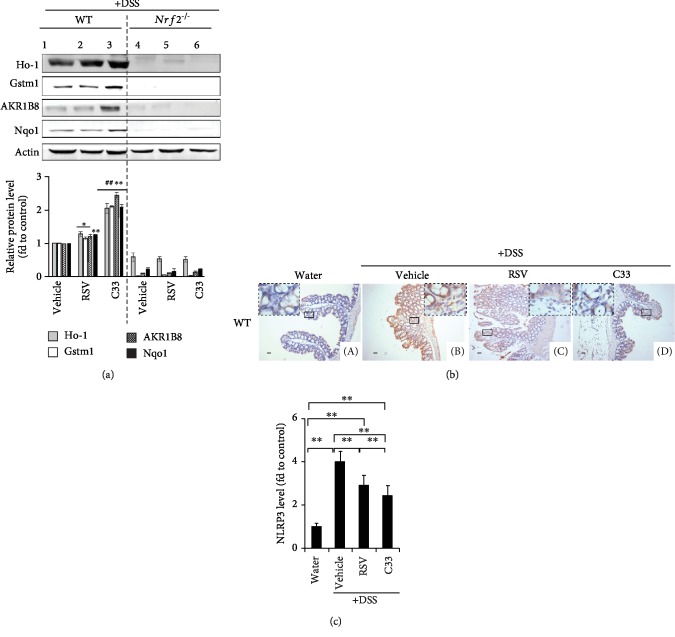Figure 5.
C33 inhibits NLRP3 expression and induces the expression of ARE-driven genes in WT colitis mice. (a) WT and Nrf2−/− mice were given C33 (200 mg/kg i.g.), RSV (200 mg/kg i.g.), or vehicle (10% ethanol) daily. Two days later, while the mice continued daily treatment with RSV or C33, they were also given normal drinking water or water containing 2.5% DSS for 7 days as in Figure 2(a). Soluble extracts from the colon of mice were analyzed by Western immunoblotting with antibodies against Ho-1, Gstm1, AKR1B8, or Nqo1. Upper panel, representative images of Western immunoblots. Each lane shows the results for a sample from a single mouse. Actin was used as a loading control. Lower panel, semiquantitative result of blot. The value for the same protein from WT mice treated with vehicle (control) was set at 1. Values are mean ± SD (n = 3). ∗p < 0.05, ∗∗p < 0.01, compared with vehicle-treated mice with same protein and phenotype. ##p < 0.01, compared with RSV-treated mice with same protein and phenotype. (b) Immunohistochemical analysis of the expression of NLRP3 in the colons from WT mice treated as in Figure 2(a) (scale bars, 100 μm; original magnification, ×200). A: mice on normal drinking water without any treatment. B: mice treated with vehicle and on drinking water containing 2.5% DSS. C: mice treated with RSV and on drinking water containing 2.5% DSS. D: mice treated with C33 and on drinking water containing 2.5% DSS. Images represent results from three separate experiments. (c) Semiquantitative results from (b). The WT mice on normal drinking water without any treatment (control) was set at 1. Values are mean ± SD, n = 3; ∗∗p < 0.01.

